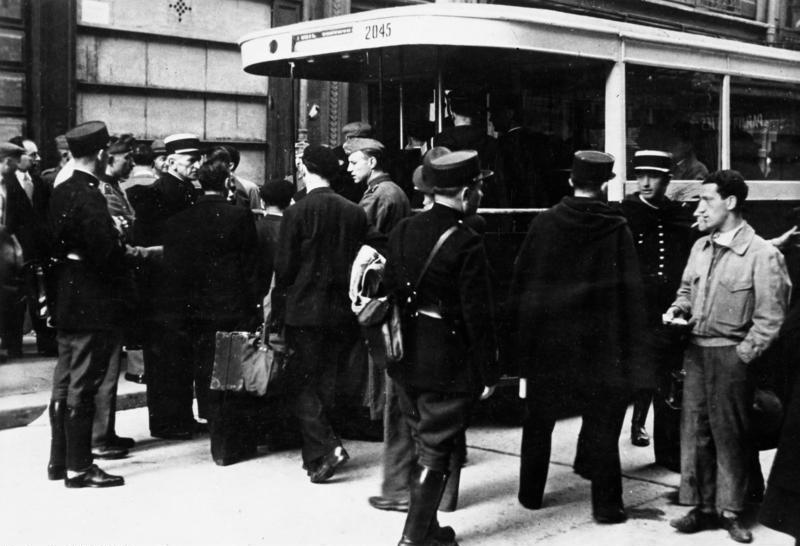Vichy – Memories of a Past that is still Present: Re-surging Nationalism and the Limits of the ‘devoir de mémoire’
The 2017 French presidential election revealed a returning obsession with France’s Vichy Past, as many politicians once again denied France’s responsibility in the deportation of the Jews during the Second World War. This essay explores the factors that led to the resurgence of nationalist revisionism in the political rhetoric and discusses how this illustrates the limits of Pierre Nora’s ‘devoir de mémoire’.
By Florian Bikard
Introduction
The debacle of June 1940 marks the beginning of an embarrassing chapter in the history of France. The Great Power was militarily crushed in six weeks by Germany, leading to the collapse of France’s democratic institutions and to the rise of a collaborationist regime under Marshal Pétain. Not only did Vichy provide military assistance and workforce to Hitler, it also took the lead in the deportation of Jews. A notorious example is the Velodrome d’Hiver’s roundup (i.e., ‘cycling track’), coordinated in June 1942 by the French Parisian police to bring over 12,000 Jews to the concentration camps.
The highly controversial actions of the Vichy regime led the ‘people in resistance’ to develop a new narrative about the role of France in World War Two. Their leader, General Charles De Gaulle, pioneered what became known in French historiography as résistancialisme. De Gaulle popularized the image of the French as a people overwhelmingly united against the occupying Germans to (re)position France as one of the victors of the war. The influence of French collaborationists was consequently minimized, not to say occulted, to fit with the idea of a people “that liberated itself”. Yet, résistancialisme did not survive long after De Gaulle’s death. The dramatic revelations on the extent of French collaboration with the German occupiers made by the American historian Robert O. Paxton[1] and the growing presence of memories of Jewish witnesses as well as narratives of Jews persecuted in the Holocaust in European public discourse eventually led the political elite to debunk résistancialisme. In his commemorative speech of the Vel d’Hiv roundup in 1995, Jacques Chirac was the first President to acknowledge that a French state existed during the ‘dark years’ of the Vichy regime, and that it shared responsibility for the persecution of the Jews.
However, while the Chiracian line of acknowledging the crimes of the Vichy regime was continued by his successors (i.e., Sarkozy and Hollande) and a broad consensus emerged in French society on the subject, résistancialisme has recently resurfaced in contemporary political discourse. On the eve of the 2017 presidential election, the far-right candidate Marine Le Pen claimed that “France was not responsible for the Vel d’Hiv” and, facing a divided opposition, received the support – albeit often tacit – of both right-wing and left-wing personalities. The following essay explores why résistancialisme returned as an important ideological landmark in the political debate on the responsibility of the French state for the crimes committed during the Second World War. In doing so, it first provides a brief outlook on the debate of whether a ‘devoir de memoire’ is an effective way to respond to nationalist distortions of history. Then, based on a discourse analysis, the essay argues that résistancialisme regained an important political value due to the growing need to re-anchor a collective identity in a glorious and consistent past.
Discourse analysis is an effective tool to explore this process and highlight how a broader societal context is encouraging the emergence of a particular politics of history, since discourses are ‘constitutive modes of power’ that are frequently used by ideologs because of their strong expressive power for the construction of realities. According to Fairclough, discourses are also ‘socially-conditioned’ processes, in that they are influenced by a particular social environment which affects the text in its form (i.e. semantics) and substance (i.e. ideology). Special attention is given here to Marine Le Pen’s interview on 9 April 2017 and to President Macron’s commemorative speech on the Vel-d’Hiv on the 17 July 2017, since both renewed the debate on résistancialisme and triggered various reactions across the political spectrum, from the ultraconservative right symbolised by Henri Guaino and Nicolas Dupont-Aignan to the far-left of Jean-Luc Mélenchon.
The ‘Devoir de Memoire’ as a Cure to Nationalist Memory – An Academic Debate on the Ideological Uses of History
There is an obvious tension and conflictual relationship between ideology and factually-accurate history. Ideological uses of history have two key characteristics: the building of a “retrospective mythology” and the non-compliance with basic rules of scholarly enquiry and integrity. Nationalists indeed arrange historical elements at the expense of factual accuracy to build coherent narratives that match and bolster their ideological agenda. Résistancialisme bears these hallmarks, through its attempt to stir patriotic feelings after the occupation by emphasizing times of presumed heroism (e.g. De Gaulle, the Resistance, the rescue of Jews) and overlooking darker moments (e.g. Pétain, the Milice, Vichy’s involvement in the Holocaust).
To ease the conflict between scholars and those who use history for political purposes, the French historian Pierre Nora promoted a state-led devoir de memoire (duty of remembrance) as part of his call for institutionalised ‘realms of memory’[2]. As such, the devoir de memoire was meant to keep the French population united around a common history despite the “atomisation of a main memory”. At the same time, the devoir de memoire provided a more critical appreciation of historyhat would highlight France’s pluralist past, give special attention to the memories of minorities, and protect them from nationalist rewritings of history. In this context, the recognition of France’s responsibility in the Vel d’Hiv roundup matches Nora’s expectations because it involved uploading the emerging memory of persecuted minorities at a national level as part of a broader national heritage.
The Denial of the French Responsibility in the Vel d’Hiv Roundup
The contemporary résistancialist debate was triggered by Marine Le Pen’s denial of France’s responsibility in the Vel d’Hiv roundup: “if there are people responsible, it’s those who were in power at the time. It’s not France”. She later added: “France was in London. I share the same opinion than General De Gaulle… Vichy was not France”. These statements to some extent marked a departure from previous attitudes for the Front National (FN)[3], since when the party was led by her father, Jean-Marie Le Pen, it was known for its complacent positions towards Marshal Pétain and its hostility towards De Gaulle who “betrayed” French Algeria by ending the Algerian War and accepting the country’s independence.
This shift in the Lepenist politics of memory deeply divided left-wing and right-wing parties, as politicians of both sides failed to present a common front in the defence of Chirac’s debunking of résistancialisme. Within the right, the former adviser of President Sarkozy, Henri Guaino, immediately supported Le Pen’s claim, asserting that “he denies France’s responsibility in this story”. The sovereigntist conservative Nicolas Dupont-Aignan similarly refused to attack the Front National and adopted a conciliatory approach, stating that “there is one France that collaborated, the Vichy one. There is one France that salvaged honour, De Gaulle’s”. Only the leader of the moderate right, François Fillon, rejected Le Pen’s statement, seeing in the Vel-d’Hiv “a crime committed by the French state”.

Djampa, Rafle Du Vel d’Hiv Plaque En Face de La Station de Métro Bir-Hakeim, 19 July 2009, CC BY-SA 4.0.
Similar divisions can be noted on the left side of the political barometer. While both the left-wing sovereigntist Jean-Pierre Chevènement and the far-left leader Jean-Luc Mélenchon acknowledged the responsibility of the collaborationist police, they did not condemn Le Pen’s statement. Chevènement refused to blame France, questioning the “legitimacy” of the collaborationist authorities. Mélenchon stated that “France was guilty but the Republic was not”, referring to Pétain’s “abolishment” of the republic. After the election, Mélenchon hardened his approach, denouncing President Macron’s Vel-d’Hiv address as a “totally unacceptable” attempt to proclaim France’s “guilt” “as a nation”.
Within the center and the left, the main defenders of the continuity with Chirac included the socialist Benoit Hamon and the centrist President Emmanuel Macron. Hamon stated that “Le Pen does not like history and prefers to arrange it”. In his commemorative address on the Vel-d’Hiv, Macron observed the need to “find the collective courage to face mistakes and crimes” because “hiding [them] is an insult to … our collective memory”. He also reaffirmed Chirac’s line, arguing that the recognition of France’s faults was “the sign of a strong nation that can face its past”. In doing so, he emphasised the devoir de memoire to a much larger extent than any of his predecessors. As such, he provided a very precise and critical historical analysis on the Vel-d’Hiv roundup by naming individually the main protagonists of the French collaborationist regime (e.g. Pierre Laval, René Bousquet). Moreover, he expressed his full support for the “work of remembrance” carried out by French historians (e.g. Serge Klarsfeld).
The Resurgence of Nationalist Revisionism
During his speech, Macron deplored the political tendency in his country to ascribe to a “high idea of France” while refusing to repent on disturbing memories of the past. Indeed, résistancialists do not only reject the devoir de memoire by rewriting the history of World War Two, they also endorse a broader patriotic revisiting of history, which they label “national novel” or “national story”. Article 97 of Le Pen’s presidential programme advocated the “strengthen[ing of] the unity of the nation through the promotion of the national novel and the rejection of repentances”. Clearly, the Front National opposes Chirac’s and Macron’s positions on the Vel d’Hiv, because their repentances, in the view of the FN, make history divisive and hence weaken the unity of the nation.
Guaino, Dupont-Aignan, Chevènement and Mélenchon all defended a similar line on the question of repentance. Guaino had already long complained that national education increasingly involved the “teaching … of a black novel of the nation”, instead of maintaining the old “national novel” that promoted “love for the homeland”. Dupont-Aignan also disapproved of the “permanent apportionment of blame” and established that “there cannot be any nation without national novel”. Chevènement, for his part, agreed that “there must be an objective national story on the history of our people” for new generations to be “willing to continue it”. Mélenchon also defended the return of a national saga and deplored the development of an “identity of executioners”. In short, for these politicians, an excessive focus on highlighting the dark sides of the country’s past needs to be rejected because it would undermine the cohesive power of a patriotically-driven history of the nation.
The New Political Value of Résistancialisme
It follows from the above that it is possible to explain the return of the résistancialist question with reference to the nationalist symbolism that is attached to it. Anthony Smith argues that “every nationalism requires a touchstone of virtue and heroism, to guide and give meaning to the tasks of regeneration”[4]. Similar to what Smith calls the ‘Myth of the Heroic Age’, Gaullist résistancialisme proposes a Manichean picture of the war: the heroic resistance against the German oppressor, the true France of De Gaulle versus the “father defeat” and betrayer Pétain. In sum, Gaullist résistancialisme provided a heroic picture of the war to restore confidence in the nation-state and tie the next generations to an age-old national saga.
The new résistancialisme of today is not so different in that it is also a response to increasing doubts regarding the future of the nation-state. First, Le Pen, Guaino, Dupont-Aignan, Chevènement, and Mélenchon all express concerns about the sustainability of a multicultural society in the absence of a strong assimilationist system. There is therefore the idea that ceasing to repent on the sins of the past would help re-attaching communities to the nation-state. Second, for Le Pen, Dupont-Aignan, Mélenchon, Chevènement, and Guaino alike, the return of a patriotic history serves as an ideological basis for agendas hostile to globalisation and European integration. The resurfacing of résistancialisme is therefore closely related to a crisis of confidence of the French nation-state and a rejection of globalisation, because of the growing assumption that national identity can only be maintained and perpetuated if it is founded on “a grand and consistent history”, to paraphrase the historian Klas-Göran Karlsson[5].
Conclusion
The divisive nature of the memory of the Vel d’Hiv demonstrates that nationalism continues to play a considerable influence in the way politicians use history in France. The recent controversy around the right way to commemorate the collaboration of the French state in the Holocaust reveals the limits of the devoir de memoire, which – despite the existence of overwhelming historical evidence about the extent of French collaboration during the German occupation – let historical revisionism resurface. Indeed, it was the growing opposition to the devoir de memoire which contributed significantly to the resurfacing of the résistancialist myth. This development has two explanations. On the one hand, the survival of French nationalism played a decisive role, leading politicians to find considerable cohesive power in résistancialisme and hence to reject its debunking in order to mobilise the population for their own political ambitions. Résistancialisme thus became a key facet of a broader public rewriting of national history that was meant to ensure the regeneration of the nation. On the other hand, politicians also use a résistancialist repertoire in response to the uncertainty of globalisation and European integration. The idea is to support the reviving of a founding tale to secure popular enthusiasm for the nation-state. In the final analysis, this novel adhesion to a more consensual Gaullist interpretation of history might be regarded as one of the reasons explaining the increasing acceptance of the far-right in domestic politics in France today.
 Florian Bikard is studying for an MA in European Studies at Maastricht University and writing a thesis on the EU’s peace mediation in the Israeli-Palestinian conflict. He holds a BA degree of European Studies from the same university and did an Erasmus semester in Political Sciences at the University of Freiburg, Germany. Florian has been involved in various associations that aim at bringing citizens closer to EU decision-making. His contribution to the citizens’ movement ‘Stand Up For Europe’ led him to represent a group of Maastricht University students at a citizens’ consultation at the European Parliament in March 2017.
Florian Bikard is studying for an MA in European Studies at Maastricht University and writing a thesis on the EU’s peace mediation in the Israeli-Palestinian conflict. He holds a BA degree of European Studies from the same university and did an Erasmus semester in Political Sciences at the University of Freiburg, Germany. Florian has been involved in various associations that aim at bringing citizens closer to EU decision-making. His contribution to the citizens’ movement ‘Stand Up For Europe’ led him to represent a group of Maastricht University students at a citizens’ consultation at the European Parliament in March 2017.
This article is a revised version of a paper produced for the course Post-war Europe: Political and Societal Transformations within the MA in European Studies at Maastricht University.
Cover image credit: Bundesarchiv-Bildarchiv, Bild 183-B10816, Frankreich, Paris, Judenverfolgung, August 1941, German Federal Archives, CC-BY-SA 3.0. Original caption: Zentralbild: August 1941 Weltkrieg 1941 Frankreich, besetztes Gebiet. Festnahme von Juden. Die Festgenommenen werden in Paris mit Autobussen abtransportiert.
Suggested reference
Florian Bikard: Vichy – Memories of a Past that is still Present: Re-surging Nationalism and the Limits of the ‘devoir de mémoire’. In: RUB Europadialog, 2019. URL: http://rub-europadialog.eu/vichy-memories-of-a-past-that-is-still-present-re-surging-nationalism-and-the-limits-of-the-devoir-de-memoire (08.07.2019).
References
[1] Robert O. Paxton, Vichy France: Old Guard and New Order, 1940-1944, Revised edition (New York: Columbia University Press, 2001).
[2] Pierre Nora, Les lieux de mémoire, tome 1 : La République (Paris: Gallimard, 1984), xxiv–xxx.
[3] Former name of the ‘Rassemblement National’ [i.e. national rally]. The party changed name in June 2018.
[4] Anthony D. Smith, Myths and Memories of the Nation (Oxford University Press, 1999), 65.
[5] Karlsson, Public Uses of History in Contemporary Europe. Manchester University Press, 39.
